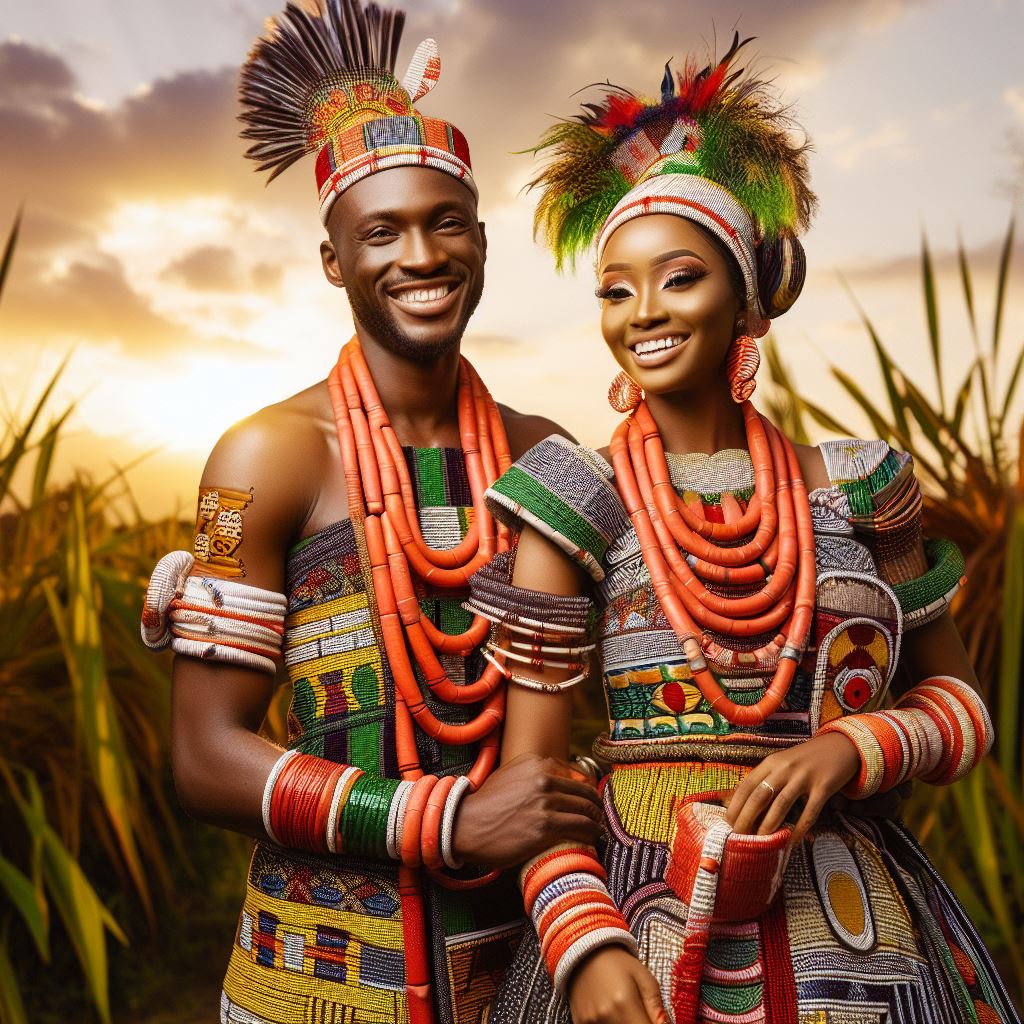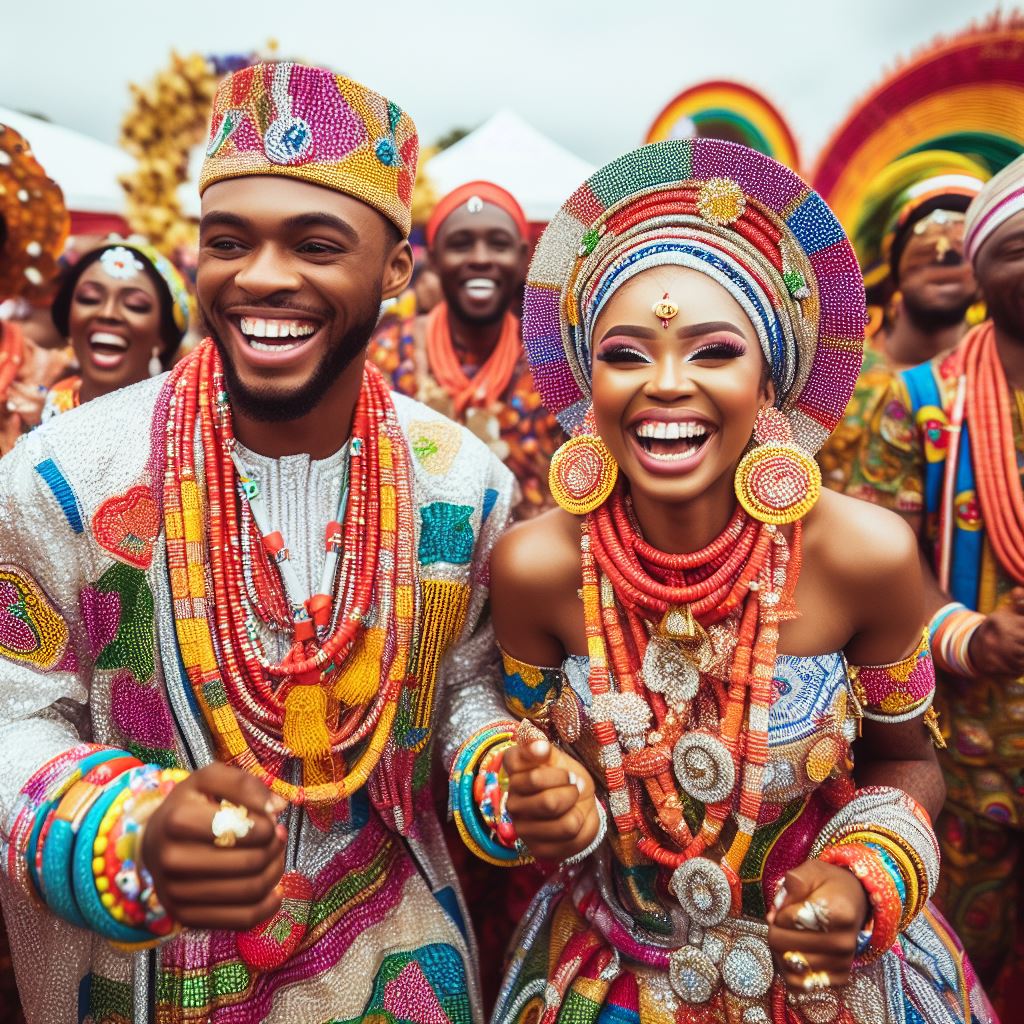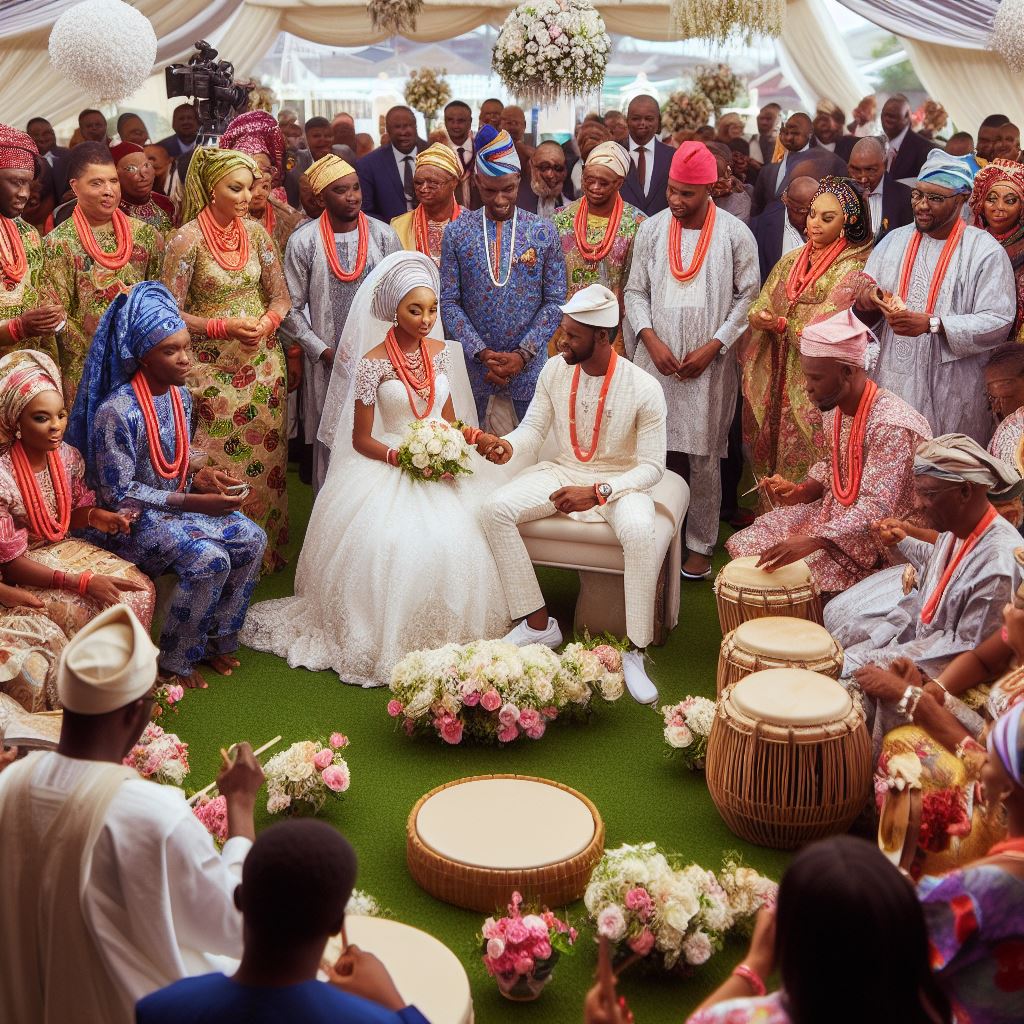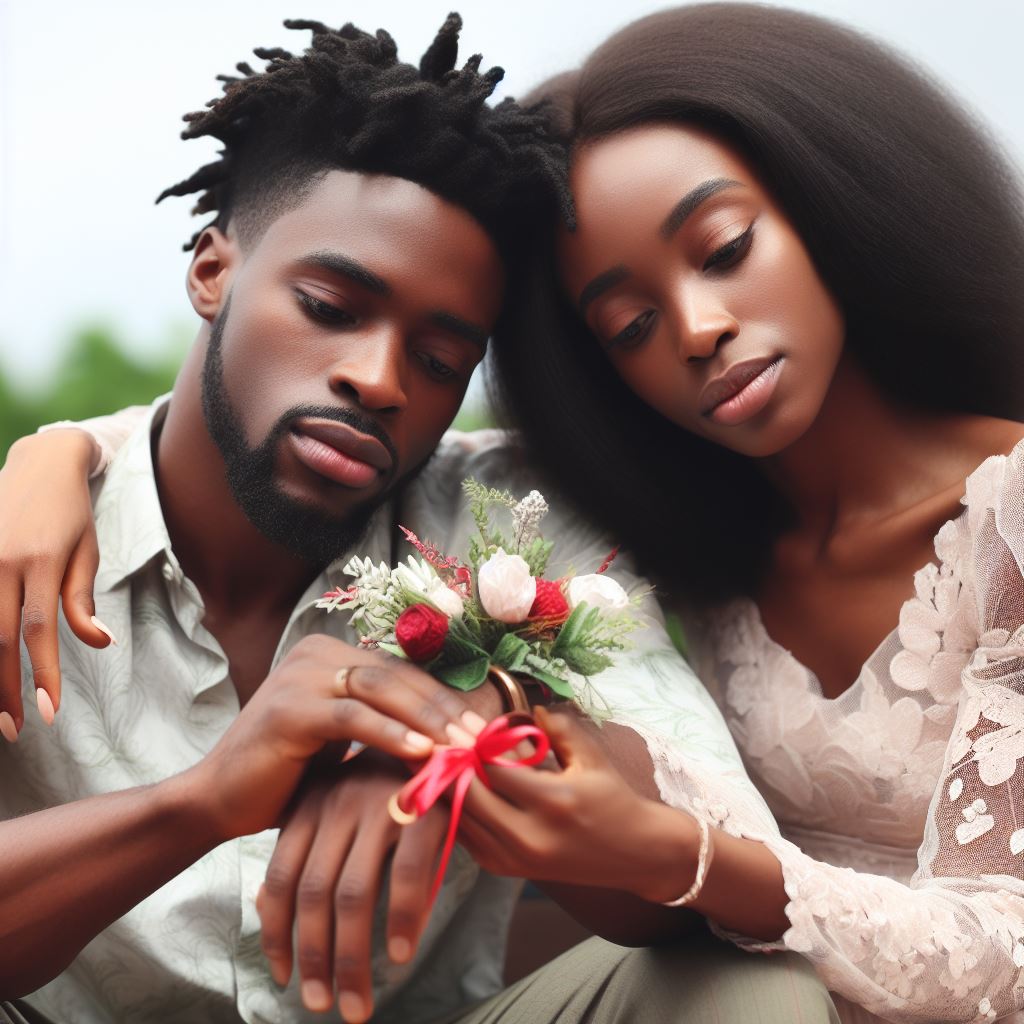Introduction
Significance of Yoruba marriage functions in Nigeria
Yoruba marriage functions hold great significance in Nigeria, serving as important cultural and social events that bring families and communities together.
They are a time for families and communities to come together to celebrate the union of two people.
Yoruba marriage functions are also a time to celebrate the rich culture and traditions of the Yoruba people.
Importance of proper planning for a successful Yoruba marriage function
Proper planning is essential for a successful Yoruba marriage function.
There are many things to consider, such as the date, time, venue, guest list, food, drinks, entertainment, and transportation. By taking the time to plan carefully, you can ensure that your marriage function is a memorable and enjoyable event for everyone involved.
Understanding Yoruba Marriage Traditions
Yoruba culture is deeply rooted in tradition and this is especially evident in their marriage functions. Yoruba weddings are known for their rich customs and the involvement of both families and the community.
Overview of Yoruba Culture and its Influence on Marriage Functions
- The Yoruba people are one of the largest ethnic groups in Nigeria, with a population exceeding 40 million.
- Their culture is characterized by a strong emphasis on hierarchy, respect, and communal living.
- Yoruba weddings are not just the union of two individuals, but also the coming together of two families and the wider community.
Key Traditions and Customs Observed in Yoruba Weddings
- The introduction ceremony, also known as the “mo mi mo e” in Yoruba, is the first step in the marriage process.
- During this ceremony, the families of the bride and groom meet to exchange gifts and negotiate the bride’s dowry.
- The “eko ile” or engagement ceremony follows, where the groom’s family officially asks for the bride’s hand in marriage.
- The bride is presented with gifts such as clothes, jewelry, and household items, symbolizing the groom’s commitment to providing for her.
- Another important tradition is the “nikkai” or wedding ceremony, which is typically held at a mosque.
- During the nikkai, the couple recites their vows and the marriage is solemnized.
- The “iroko” or traditional engagement ceremony is also a significant part of Yoruba weddings.
- During this ceremony, the bride’s family presents the groom’s family with a list of items known as “Eru Iyawo” or bride’s price.
- The groom’s family is expected to provide these items as a gesture of their commitment and ability to care for the bride.
The Role of Both Families and the Community in Yoruba Marriage Celebrations
- Yoruba weddings are not just private affairs, but community celebrations that involve everyone.
- Both families play an active role in the planning and execution of the marriage function.
- Extended family members, friends, and community elders also provide guidance and support throughout the process.
- The Yoruba people believe that a successful marriage is not just a union between two individuals, but a union between families.
- They place a strong emphasis on the support and involvement of the extended family and community in the marital journey.
- Community members contribute financially, provide advice, and participate in various roles during the wedding ceremonies.
- Yoruba weddings are known for their vibrant and colorful celebrations, filled with traditional music, dance, and feasting.
- These celebrations serve as a way to strengthen community bonds and celebrate the union of two families.
In short, Yoruba marriage functions are deeply rooted in tradition and involve the active participation of both families and the community.
Understanding the customs and traditions associated with Yoruba weddings is essential when planning a Yoruba marriage function to ensure a meaningful and culturally rich celebration.
Read: Marriage is Honourable: Teaching the Next Generation its Value
Setting the Date and Budgeting
When it comes to planning a Yoruba marriage function, selecting a suitable date is essential. It sets the tone for the entire event and influences various other aspects.
Budgeting is another crucial factor that needs to be considered. Let’s explore the importance of a suitable date and budgeting tips for a successful Yoruba marriage function.
Importance of Selecting a Suitable Date
- Auspiciousness: In Yoruba culture, certain days are considered more favorable for marriages. Choosing an auspicious date can bring good luck and blessings to the couple.
- Availability of Key People: It is important to select a date when all the significant individuals, such as immediate family members and close friends, are available to attend the function.
- Weather Considerations: Considering the weather conditions during the selected date is crucial to ensure the comfort and enjoyment of the guests.
- Availability of Vendors: Some dates may be more popular among vendors, so it is essential to book them in advance for a smooth planning process.
Tips for Considering Budgeting Factors
- Venue: Selecting an appropriate venue that accommodates the number of guests and fulfills the desired ambiance within the allocated budget is important. Comparing different options can help make an informed decision.
- Catering: Choosing a catering service that suits the couple’s taste, caters to dietary restrictions, and offers cost-effective options can help manage the budget efficiently. Negotiating prices and considering alternative catering options such as self-catering or potluck can also be considered.
- Decorations: Balancing the aesthetics and the budget for decorations is crucial. Exploring DIY options or renting decor items can be a cost-effective solution.
- Financial Planning: Creating a comprehensive budget plan, including all estimated expenses and income sources, plays a significant role in successfully organizing a Yoruba marriage function.
Significance of Financial Planning and Allocation of Resources
Efficient financial planning ensures the availability of resources required for a successful Yoruba marriage function.
It allows for proper allocation of funds to different aspects such as venue, catering, and decorations. Here are some key benefits of financial planning:
- Eliminates Unnecessary Expenses: By using a budget, unnecessary expenses can be identified and eliminated, ensuring that the allocated funds are utilized effectively.
- Reduces Stress: Proper financial planning reduces stress by providing clarity on available resources and making informed decisions based on the budget.
- Prioritizes Spending: Financial planning helps in setting priorities and allocating funds accordingly, ensuring that essential aspects of the function are given due importance.
- Allows for Savings: Effective budgeting results in potential savings, which can be utilized for other purposes such as honeymoon or future investments.
Overall, setting the date and budgeting play vital roles in planning a Yoruba marriage function.
Selecting a suitable date ensures auspiciousness, availability, and comfort, while budgeting allows for efficient allocation of resources, minimizing unnecessary expenses, and reducing stress.
With proper planning, a Yoruba marriage function can be a truly memorable and joyous occasion for everyone involved.
Read: The Importance of Honouring Commitment in Nigerian Marital Practices
Traditional Engagement Ceremony
- The traditional engagement ceremony, known as “Introduction” in Yoruba culture, is a significant part of Yoruba weddings.
- During this ceremony, the families of the bride and groom come together to formally introduce themselves and discuss the union.
- The steps involved in the introduction ceremony hold great significance and reflect the rich cultural heritage of the Yoruba people.
Steps involved in the introduction ceremony and the significance of each
Greetings and Prayer
At the start of the engagement ceremony, the families exchange warm greetings, showing respect and unity.
A prayer is offered, seeking blessings for the couple’s union and expressing gratitude for the coming together of two families.
Exchange of Gifts
The groom’s family presents gifts, known as “Eru Iyawo,” to the bride’s family as a symbol of their appreciation and goodwill.
These gifts include items such as clothing, jewelry, money, and traditional Yoruba items like kolanuts and palm wine.
Acceptance of the Bride Price
The bride price, known as “Ego Ori Omo,” is presented by the groom’s family to the bride’s family.
This symbolizes the groom’s commitment to taking care of the bride and ensures her security in the marriage.
Exchange of Vows
The bride and groom exchange vows, expressing their love, commitment, and readiness to embark on the journey of marriage.
They make promises to support and respect each other, to build a harmonious family, and to uphold Yoruba cultural values.
Blessing of Elders
The blessings of the elders play a vital role in Yoruba culture. The couple seeks the guidance and prayers of their parents and older family members.
The elders offer words of wisdom, encouragement, and advice, promoting a strong foundation for the couple’s future.
Feasting and Celebration
The engagement ceremony is followed by a grand celebration filled with music, dance, and delicious Yoruba cuisine.
Traditional dishes, such as pounded yam and egusi soup, jollof rice, and fried plantains are served, creating a joyful atmosphere.
To ensure a memorable and culturally authentic engagement ceremony, here are some top tips:
Tips for Organizing a Memorable and Culturally Authentic Engagement Ceremony
- Consult with traditional Yoruba wedding planners who have experience in organizing authentic ceremonies.
- Involve elders from both families in the planning process to ensure the cultural aspects are respected.
- Choose a venue that reflects Yoruba traditions, such as a family compound or a beautifully decorated traditional hall.
- Engage a knowledgeable Master of Ceremony who can guide the proceedings in a culturally appropriate manner.
- Select traditional Yoruba attire for the bride, groom, and families to create an authentic visual appeal.
- Arrange for traditional Yoruba music and drummers to add a lively and cultural ambiance to the event
- Incorporate cultural elements like storytelling, proverbs, and dances into the ceremony to showcase Yoruba traditions.
- Serve traditional Yoruba dishes and drinks to give guests a taste of the rich flavors and culinary heritage.
- Create a seating plan that allows both families to interact and bond, fostering a sense of unity.
- Ensure that the ceremony is documented through professional photography or videography to capture lasting memories.
By following these tips, you can organize a memorable and culturally authentic Yoruba engagement ceremony that honors tradition and celebrates the union of two families.
Read: Historical Perspectives: The Evolution of Honour in Nigerian Marriages
Choosing the Aso-Ebi and Attire
Significance of Aso-Ebi (family uniform) in Yoruba marriage functions
In Yoruba marriage functions, the selection of the Aso-Ebi, or family uniform, holds great significance. It is a way for family members and friends to identify with the couple and show their support and unity.
Tips for selecting the Aso-Ebi fabric and design
- When choosing the Aso-Ebi fabric and design, there are a few tips to keep in mind. Firstly, consider the couple’s preferred colors or theme for the wedding. This will help in selecting a fabric that aligns with their vision.
- Additionally, it is important to factor in the budget of the guests when choosing the Aso-Ebi fabric. Opt for fabrics that are affordable and easily accessible, ensuring that everyone can participate in the family uniform.
- While there are no hard and fast rules for selecting the Aso-Ebi design, it is advisable to choose a design that suits the fabric and is flattering to all body types. Simple and elegant designs are often preferred.
Attire options for the bride, groom, and other family members
- For the bride, the choice of attire is a crucial aspect of the wedding planning process. Traditional Yoruba brides usually wear the iconic “Aso-Oke” fabric, which is made from rich and intricately woven material.
- The Aso-Oke fabric is often adorned with stunning embroidery and embellishments that reflect the bride’s personal style and taste. It is also customary for the bride to wear a matching headpiece known as the “gele” and traditional jewelry.
- The groom, on the other hand, usually opts for a traditional Yoruba attire called “Agbada” or “Buba and Sokoto.” These outfits are made from colorful and finely woven fabrics, often paired with a matching cap and shoes.
- For other family members, the choice of attire should complement the couple’s outfits while still allowing them to stand out.
- It is common for family members to coordinate their attire with the Aso-Ebi fabric, either by wearing outfits made from the same fabric or by incorporating it into their attire through accessories.
When planning a Yoruba marriage function, the selection of the Aso-Ebi and attire plays a significant role in creating a cohesive and visually appealing event.
By considering the couple’s preferences, budget, and body types, guests can participate in the family uniform and showcase their support for the happy couple.
Remember, the Aso-Ebi is not just a fashion statement; it is a reflection of unity and love within the Yoruba community. So, choose wisely and celebrate the joyous occasion in style!
Read: Cherishing Marital Bonds: Why Nigerians Believe ‘Marriage is Honourable’
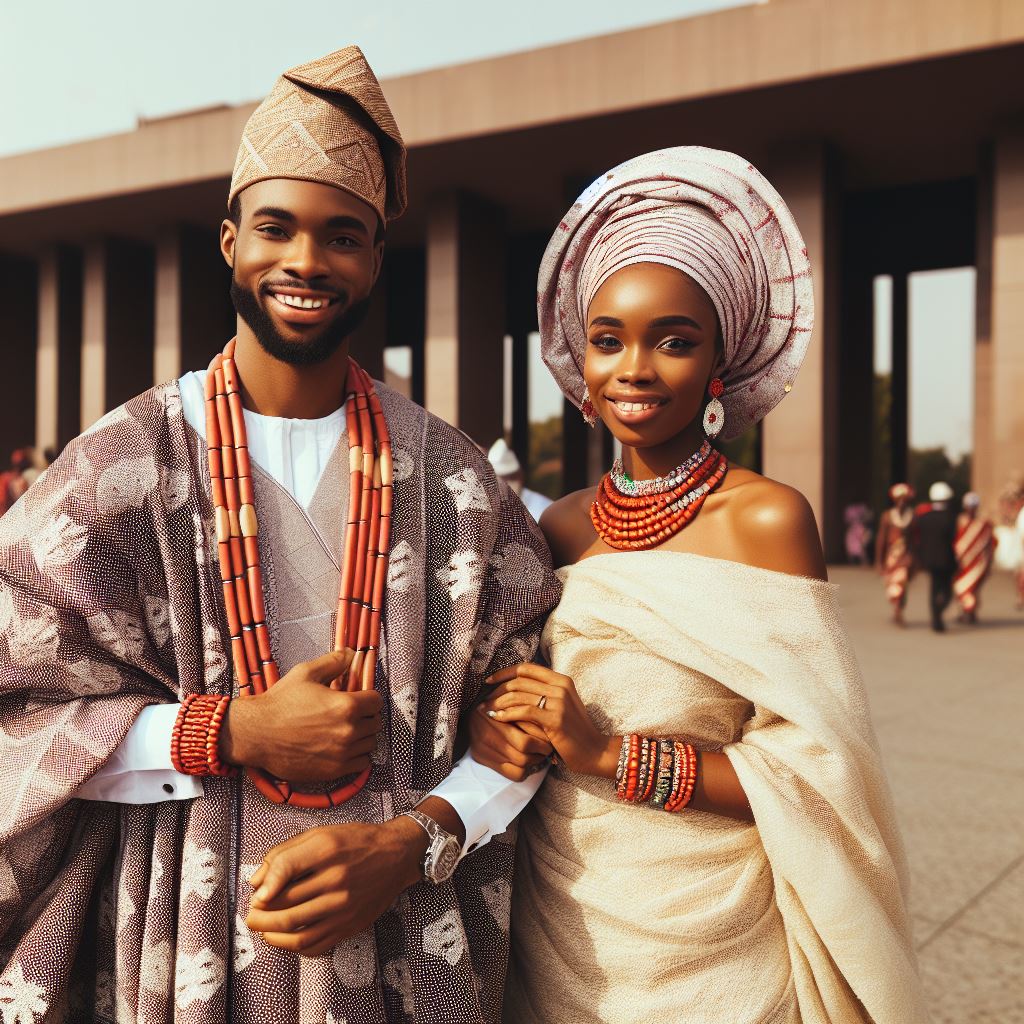
Traditional Wedding Ceremony
In Yoruba culture, the traditional wedding ceremony holds great significance. It is a celebration of love, unity, and the joining of two families.
Understanding the rituals and customs involved is essential for organizing a smooth and enjoyable event.
Explaining the Traditional Wedding Ceremony in Yoruba Culture
- Introduction of the Families: The ceremony begins with the formal introduction of the families of the bride and groom.
- Exchange of Gifts: Gifts, known as “owo ori,” are exchanged between the families as a symbol of goodwill and acceptance.
- Agreement by the Families: The two families agree upon the terms and conditions of the marriage, including the bride’s dowry.
- Obtaining the Bride’s Consent: The bride is asked if she willingly accepts the groom as her husband, ensuring her consent in the marriage.
- Prayer and Blessings: A prayer is offered, seeking blessings for the couple and their future together.
- Tying the Knot: The symbolic act of tying a white cloth around the couple’s wrists represents their union and commitment.
- Paying the Dowry: The groom presents the agreed-upon dowry to the bride’s family as a sign of appreciation and respect.
- Breaking of Kola Nuts: Kola nuts are broken and shared among the families as a gesture of welcoming and unity.
Key Rituals and Customs in the Wedding Ceremony
- Traditional Attire: The bride and groom wear traditional Yoruba attire, which often includes vibrant colors and intricate embroidery.
- Traditional Music and Dance: Live music performances and traditional dances such as “Bata” and “Sakara” add joy and cultural richness to the ceremony.
- Oruko Naming Ceremony: The bride and groom’s parents may seize the opportunity to officially name their grandchild-to-be during the ceremony.
- Feasting and Celebration: A grand feast, known as “Igbeyawo,” follows the ceremony, where guests enjoy traditional Yoruba delicacies.
Tips for Organizing a Smooth and Enjoyable Traditional Wedding Ceremony
- Plan in Advance: Start planning early and make a detailed checklist to ensure all aspects of the ceremony are covered.
- Decide on a Budget: Set a budget and allocate funds accordingly to avoid overspending.
- Engage Traditional Wedding Planners: Consider hiring experienced traditional wedding planners who can provide valuable guidance and expertise.
- Involve Family and Friends: Delegate responsibilities to close family members and friends to relieve some of the planning stress.
- Choose a Suitable Venue: Select a venue that can accommodate all guests comfortably and aligns with the cultural significance of the ceremony.
- Collaborate with Caterers and Decorators: Work closely with professionals specialized in traditional Yoruba cuisine and decorations to create an authentic ambiance.
- Arrange Transportation and Accommodation: Ensure that transportation and accommodation arrangements are made well in advance for out-of-town guests.
- Enlist Professional Photographers: Hire skilled photographers and videographers to capture all the precious moments of the ceremony.
- Prepare a Program: Create a program that outlines the sequence of events to keep the ceremony organized and on schedule.
- Spread the Word: Send out invitations in a timely manner and use various communication channels, including traditional methods, to invite guests.
Planning a Yoruba traditional wedding ceremony is an exciting and meaningful endeavor. By understanding the rituals, customs, and following these tips, you can ensure a memorable and harmonious celebration that honors the rich traditions of Yoruba culture.
Entertainment and Music
When it comes to Yoruba marriage functions, music and entertainment play a significant role in creating a joyful and festive atmosphere.
Here, we will discuss the importance of music and entertainment, highlight traditional Yoruba music genres and dance styles, and provide tips for selecting appropriate options for your special day.
Importance of Music and Entertainment
- Music and entertainment are integral parts of Yoruba culture and traditions.
- They help set the mood and ensure the celebration is lively and enjoyable.
- Yoruba music and entertainment create a sense of unity and togetherness among guests.
- They bring people from different age groups together and invoke a sense of nostalgia.
Traditional Yoruba Music Genres and Dance Styles
- Jùjú music: It is a popular genre characterized by the use of guitars and drums.
- Apala music: This genre uses traditional Yoruba percussion instruments and has a distinct rhythm.
- Fuji music: Originating from Islamic traditions, this genre combines percussion, vocal chants, and traditional instruments.
- Sakara music: It features the use of shekere (a type of gourd shaker) and drumming.
Tips for Selecting Appropriate Music and Entertainment
- Consider your personal preferences and the preferences of your partner and families.
- Research and hire a reputable live band or DJ who specializes in Yoruba traditional music.
- Discuss with the musicians about incorporating traditional Yoruba songs and dances into the performance.
- Ensure the music and entertainment options are suitable for guests of all ages.
- Engage professional Yoruba dancers who can showcase traditional dance styles during the celebration.
- Include a variety of music genres to cater to different tastes and create a vibrant atmosphere.
- Coordinate with the entertainment team to plan for special performances or surprises.
- Provide your guests with the opportunity to participate and dance to the traditional Yoruba rhythms.
- Consider incorporating cultural elements like gele tying tutorials or drumming workshops for an interactive experience.
Remember, the goal is to create an unforgettable and culturally-rich experience for everyone attending your Yoruba marriage function.
Music and entertainment are powerful tools that can enhance the overall ambiance and bring the essence of Yoruba traditions to life.
Food and Drinks
Food and drinks play a significant role in Yoruba marriage functions. They are not only a way to satisfy hunger but also hold cultural and traditional significance.
Here are some tips for planning a fantastic culinary experience for your guests:
Discuss the Significance of Food and Drinks
- Food and drinks symbolize abundance, prosperity, and hospitality in Yoruba culture.
- They represent the couple’s ability to provide for their extended family and guests.
- Feasting during weddings is a way of showing gratitude and celebrating the couple’s union.
Highlight Popular Yoruba Dishes and Special Delicacies
- Amala: A favorite Yoruba dish made from yam or cassava flour, usually served with various types of soups.
- Ewedu and Gbegiri: These soups are commonly paired with Amala and add a unique flavor to the meal.
- Jollof Rice: A well-known Nigerian dish that is a staple at Yoruba weddings, often served with fried chicken or beef.
- Moin Moin: A steamed bean pudding cooked with spices and served as a side dish or appetizer.
- Pounded Yam: Made by pounding boiled yam until smooth, traditionally eaten with Egusi or Okra soup.
- Suya: A popular Yoruba delicacy consisting of spiced and grilled skewered meat, usually served as a finger food.
- Pepper Soup: A flavorful and spicy soup made with various types of meat, fish, or chicken.
Tips for Planning the Menu
- Consider the number of guests when planning the menu to ensure there is enough food for everyone.
- Offer a variety of dishes to cater to different tastes and dietary requirements.
- Include both traditional Yoruba dishes and popular continental options to provide a diverse culinary experience.
- Hire experienced caterers who specialize in Yoruba cuisine to ensure the authenticity and quality of the food.
- Take into account any cultural or religious restrictions some guests might have, such as vegetarian or halal options.
- Have a separate station dedicated to special delicacies to give guests a chance to try unique Yoruba flavors
- Consider setting up live cooking stations where guests can witness the preparation of certain dishes.
Enabling an Enjoyable Culinary Experience for Guests
- Ensure there are enough waiting staff to serve the guests promptly and manage any special requests or allergies.
- Provide an open bar with a variety of drinks, including traditional Yoruba drinks like Zobo and Palm Wine.
- Offer non-alcoholic alternatives for guests who do not consume alcohol or prefer other beverages.
- Create a cozy and inviting dining atmosphere with beautiful decor and comfortable seating arrangements.
- Encourage guests to indulge in the delicious food by having a food tasting session before the wedding
- Consider incorporating music and cultural performances during the dining experience to enhance the ambiance.
- Have a designated area for guests to socialize and enjoy their meals comfortably.
In essence, food and drinks are essential elements of a Yoruba marriage function. By highlighting popular Yoruba dishes, planning a diverse menu, and focusing on guest satisfaction, you can ensure an unforgettable culinary experience for all attendees.
You Might Also Like: The Role of Proverbs in Nigerian Wedding Blessings
Conclusion
Summary of the key points discussed in the blog post
Planning a Yoruba marriage function requires careful attention to detail and proper preparation.
The key points discussed in this blog post highlight the significance of planning for a successful Yoruba wedding experience.
Emphasis on the importance of proper planning for a successful Yoruba marriage function
It is important to emphasize the importance of planning in order to avoid any unnecessary stress or confusion on the day of the function.
A well-planned event will allow the couple, their families, and guests to fully immerse themselves in the Yoruba wedding traditions and customs, resulting in a truly authentic and meaningful experience.
Encourage readers to implement the provided tips and enjoy a memorable Yoruba wedding experience
- By following the tips provided, readers can ensure that every aspect of the function is well-organized, from choosing the right date and venue to selecting traditional attire and arranging for the necessary ceremonies.
- This thorough planning will contribute to the creation of a memorable and enjoyable event for all involved.
- With the proper planning and attention to detail, readers can confidently embrace the Yoruba culture and enjoy a memorable wedding celebration.
- Implementing the tips discussed in this blog post will undoubtedly contribute to the success of their Yoruba marriage function, ensuring a joyous and unforgettable experience for everyone involved.

